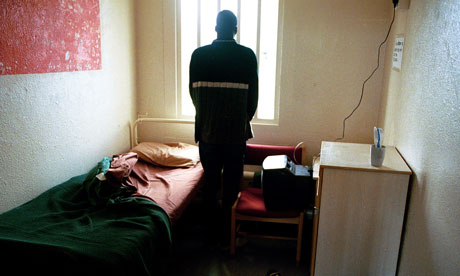Child offenders 'dumped in prison' as cuts erode social care
Thousands of children are being imprisoned for minor offences such as playground fights as support services are cut, says Centre for Social Justice thinktank
An inmate in his cell at Feltham Young Offenders Institution. Photograph: Martin Godwin for the Guardian
Thousands of children are being "needlessly dumped in prison" because of continuing cuts to traditional support services, according to a thinktank with close ties to senior Conservatives.
The Centre for Social Justice (CSJ) warns that a worrying dynamic has developed in which courts and prisons are effectively being used to "parent children". A report published tomorrow, utilising input from senior police officers, magistrates and youth justice officials, calls for a dramatic cut in the 5,000 children currently given custodial sentences a year, claiming too many are imprisoned for relatively minor offences.
Among the cases highlighted is that of one child who was imprisoned in a police cell after throwing a bowl of cereal at his care worker before jumping out of a window and climbing back inside.
The report concludes that the imprisonment of young people between the ages of 10 and 17 in England and Wales is too high and should be restricted to the "critical few" guilty of serious crimes and posing a serious public threat.
Instead, too many youngsters are appearing before youth courts for trivial reasons with some effectively prohibited from certain types of future employment following minor incidents such as "playground fights". The biggest concern, however, is the way the youth justice system is increasingly expected to sweep up cases that other departments, such as social services, are failing to address.
Gavin Poole, executive director of the CSJ, which was set up by Iain Duncan Smith, the work and pensions secretary, said: "As a society, we can do better than simply condemn these children for their crimes. We believe there are more effective and demanding ways of delivering justice than through punishment alone.
"Many young people fall into the system unnecessarily and do not receive the help they need to free themselves from it."
Poole says a new approach is required to transform the lives of child offenders. In the long term, he says, measures to prevent lawbreaking by young people should be the primary responsibility of council child welfare services rather than the youth justice system. In addition, emphasis should switch from short sentences to non-custodial punishments, such as more rigorous community sentences and restorative justice schemes. Schools, social care teams, mental health services and families should play a more central role in helping rehabilitate young offenders, states the report.
Poole added: "Custody is sometimes neither a protective nor a productive place for children. Despite years of good intentions, many young people leaving custody are still not being provided with the basic support they need for rehabilitation.
"Many of these young people consequently become the life-long persistent offenders who are saturating our adult prisons."
On Friday, the prison population rose to 86,986 – up 348 in one week – reaching 97.2% capacity and raising fears that the customary winter increase will stretch the prison system to breaking point.
Sadiq Khan MP, shadow justice secretary, said: "There isn't the capacity to cope with a similar rise this year, endangering public and staff safety as a result."
A Ministry of Justice spokesman said: "We accept that low-level youth offending is not always best dealt with by prosecution, which is why a range of techniques are used to tackle younger offenders, including out-of-court disposals, robust support and interventions.
"Reforms taking place include young people paying back victims, financial support for 12,000 troubled families, and new programmes designed to tackle the root causes of reoffending."
Reform of the youth justice system, according to the CSJ, would also bring significant savings. Places in youth custody cost between £69,600 and £193,600 a year, and computer modelling indicates an effective youth justice system would halve the annual £4bn cost of youth crime by sharply reducing reoffending and the numbers being imprisoned.


No comments:
Post a Comment